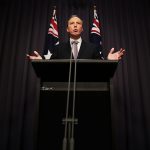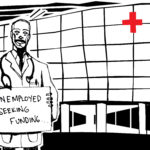Don’t let capitalism blame migrants for its failures
A spirit of internationalism and solidarity is needed to hold elites accountable for their greed, ineptitude and lack of political imagination.
Author:
10 December 2018

The figure of the monstrous immigrant, slouching towards porous national borders bringing chaos and crime, stalks the contemporary political imagination. In Europe and the United States, refugees from war, impoverishment and the incipient effects of climate change, have been met with the electoral resurgence of far-right parties, racist violence and militarised repression. Now, in South Africa, politicians find migrants an easy scapegoat for failures in governance.
As Jan Bornman recently observed in New Frame, Health Minister Aaron Motsoaledi blames the appalling state of the country’s health system on disease-ridden “foreign nationals”. This while Johannesburg Mayor Herman Mashaba, an aspiring Donald Trump if there ever was one, accuses migrants of bringing “Ebolas” (sic) to the city.
While these lurid accusations can be factually disproven, their hysterical inaccuracy may, in fact, be the entire point. By using the metaphor of disease, politicians channel attention away from facts and policies into nightmarish imagery of global pandemics and corpses piled up in hospitals, inviting the public to respond with visceral terror.
Related article:
Fabricated modes of panic around disease are a noticeable strand in the history of racism in South Africa. Historian Maynard Swanson coined the term “sanitation syndrome” to describe how colonial authorities used metaphors of contagion, infection and quarantine to enforce early urban segregation. But the political utility of such metaphors extends globally. Throughout history, oppressed and rebellious populations have been painted as contagious, even supernatural, threats to the dominant order.
Dissenting and independent women in early modern Europe were hunted and burnt at the stake as witches. And as historians Peter Linebaugh and Marcus Rediker showed, colonial rulers from the 17th century to the 19th century used the Greek myth of the Hydra, a many-headed water serpent that was decapitated by the hero Hercules, to describe rebellious proletarians and enslaved peoples. Elites saw the restive international working class as a monstrous threat to the emerging capitalist system to be controlled with political and judicial violence so that the social “body” could be cleansed.
‘Boomeranging’ realities
For the Martinican poet and theorist Aime Césaire, techniques of repression and control pioneered in the colonial South “boomeranged” back to the North in the form of European fascism. An especially disturbing reminder of this process comes from Southern Africa, where many of the tactics associated with the horrors of 20th century European fascism were first piloted. The concentration camp was invented by the British during the South African War, while the German Empire’s extermination of rebellious Herero and Nama groups in Namibia was a key precursor to the Nazi holocaust. When fascism hacked a bloody path through Europe, old tropes about certain groups of people carrying diseases were revived with catastrophic results.
Related article:
But concepts also boomerang back around, seen in how language used by the contemporary Northern far-right is echoed by South African leaders. In 2015, Trump, a noted germaphobe in his personal life, began his presidential campaign with invective against Mexican migrants, claiming “tremendous infectious disease is pouring across the border”. Just this month, in a segment captioned Caravan of Disease, Fox News presenter Tomi Lahren stated that “people in border states like mine better pull their heads out of the sand real quick. Do you want TB, HIV/Aids, chicken pox or hepatitis in your communities and your children’s schools? Because I have a feeling that the warm and fuzzy spirit of compassion doesn’t treat or prevent diseases like those.”
These kinds of comments are just the tip of the rhetorical arsenal. In right-wing media and online spaces, the migrant is the agent of all abjection – crime, terrorism, rape and general malice. And this toxic politics has boomeranged back to Africa from Europe and its settler colonies. On the question of migration in South Africa, powerful political leaders from the ANC, DA and EFF are increasingly sounding like the far right in the North.
Related article:
The imagined “satanic” migrant collects a bundle of anxieties. The economic stagnation caused by failed austerity policies, and the sense that the “good times” are never coming back, has inspired a palpable sense of dread in wealthier countries. The far right has successfully channelled anxiety away from a systemic critique of the status quo into discourses of racial and cultural conflict, which claim that stability and prosperity can be restored once the nation-state is fortified against intruders.
A key expression of this is the idea of “economic nationalism” advocated by Trump’s former campaign adviser Steve Bannon, who has been advising reactionary political parties across the world (many of which are rebranded versions of post World War II neo-fascist organisations) on how to win elections. A showman with a Hollywood background in video games and online media, Bannon claims that a “globalist” elite is directly encouraging mass migration to crush the working and middle classes of the North. Some of his statements about economic globalisation even echo common leftist critiques of neoliberalism, publicly railing against the immiseration caused by the “Party of Davos”.
Creeping fascist ideas
But his vision of economic protectionism is not motivated by anti-capitalist sentiments, rather, it is motivated by the belief that a “Christian West” is currently engaged in an apocalyptic holy war against its racialised enemies. Some of his stated influences include the Italian fascist and occultist Julius Evola and Jean Raspail’s sadistic, racist novel Camp of Saints, which imagines France overrun by hordes of barbaric refugees. Shorn of these esoteric inspirations, Bannon’s ideas are gaining political purchase elsewhere.
But it is not just the far right that is actively inciting xenophobic paranoia. Hillary Clinton recently claimed that political instability in Europe is a result of migration. A widely derided piece by the Irish author Angela Nagle, titled The Left Case against Open Borders makes the dubious argument that migration is responsible for stagnating wages and weak unions, again placing the blame of capitalism’s failings on the politically marginal. As scholar Alexander Reid Ross puts it, these are clear indicators of how fascist ideas “creep” into more mainstream discourses, subtly reworking them in its reactionary image.
Related article:
Any genuinely progressive politics needs to steer away from the sirens that call for nationalism and fortified borders. Blaming migrants for overstretched services and social dysfunction lets elites off the hook for their greed, ineptitude and lack of political imagination. As a currently popular image on social media puts it, “the enemy arrives by limousine, not by boat”.
Toward a ‘mobile commons’
In her new book Mobility Justice, Mimi Sheller argues that the unparalleled challenges of the 21st century, in particular environmental catastrophe and climate change, are too vast and multicausal to be confronted at a national level. By engaging in the Hobbesian struggle of trying to hoard whatever meagre scraps the ruling class deign to give, we only further entrench privatisation, enclosure, austerity, militarisation and coloniality, and inhibit the recognition of a common humanity. The challenge of our time is to create a “mobile commons” of care and solidarity across local, regional and national scales.
The global reactionary wave – from Trump and Brexit to Bolsonaro in Brazil and Duterte in the Philippines – has advanced its political aims by inciting and weaponising fear. These ideas are given an emotive charge by drawing on the potent tropes of threat, chaos and bodily disintegration. But, ironically, fictional narratives about global pandemics provide a critical counter-thinking about social crisis. In the hugely influential Living Dead films of subversive director George Romero, which created the modern image of the zombie, survivors are felled not so much by the hordes of disease-ridden corpses, but by their attachment to racist, consumerist and militaristic values that prevent them from working together in a crisis.
Related article:
The 2006 film Children of Men is set in a near-future where a mysterious illness has rendered women infertile. In the ensuing social collapse, refugees are demonised, hunted and, in a disturbing harbinger of real life in 2018, placed in cages. All hope of a future has vanished, yet consumer capitalism remains. As cultural theorist Mark Fisher wrote at the time of the film’s release, the world “it projects seems more like an extrapolation or exacerbation of ours than an alternative to it. In its world, as in ours, ultra-authoritarianism and capital are by no means incompatible: internment camps and franchise coffee bars coexist”. Theo Faron, the lead character played by Clive Owen, observes that what dooms society is not an external threat but the inhumane response to urgent social issues. “Even if they discovered the cure for infertility, doesn’t matter! Too late. World went to shit. Know what? It was too late before the infertility thing happened,” says Faron.
The anti-migrant ideas that are cynically deployed by South African politicians offer the false hope that capitalism and the state will be able to provide for the citizenry if people with the wrong accents and names can be rounded up, detained and deported. The coming displacements caused by global warming, which even organisations such as the World Bank acknowledge, will cause historically unprecedented refugee movements, and give an added urgency to confronting xenophobic discourses and practices in the present.
There are no easy answers to our multiplying social crises. But what is clear is that they need to be faced with a spirit of internationalism and solidarity, rather than divisive and corrosive separation. Figures such as Mashaba and Motsoaledi are the enemies of any progressive project worthy of the name.





